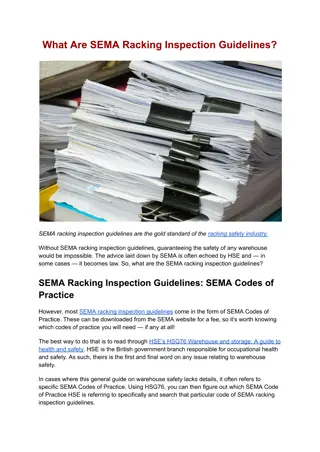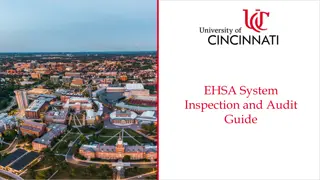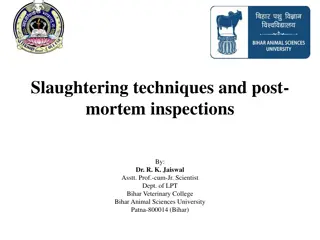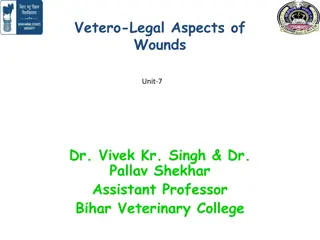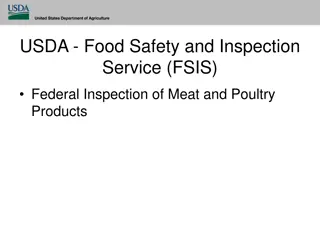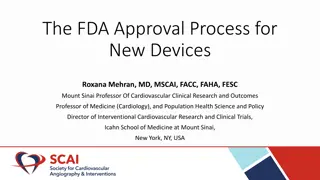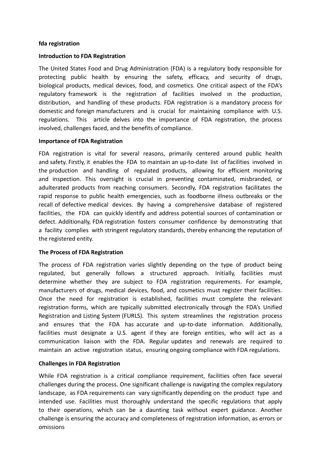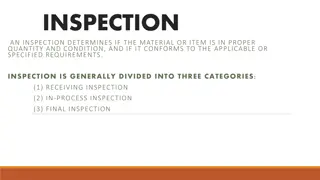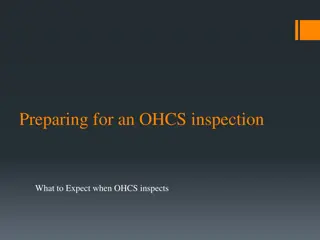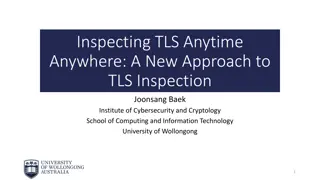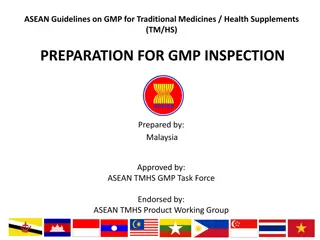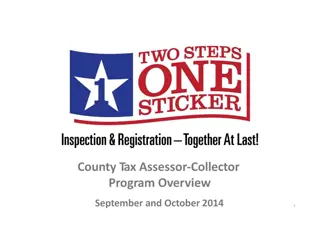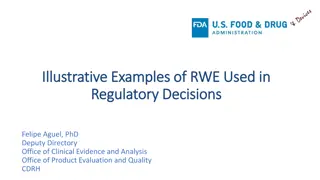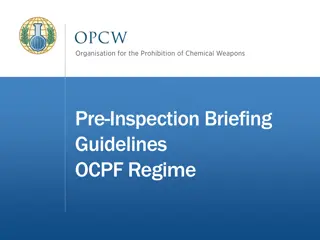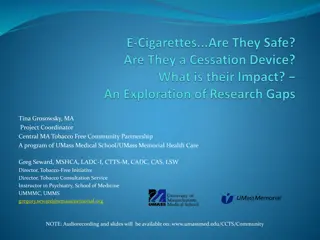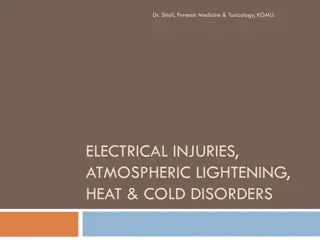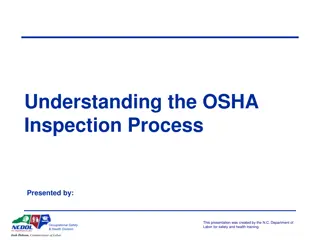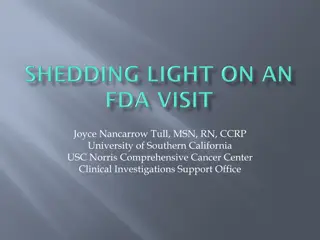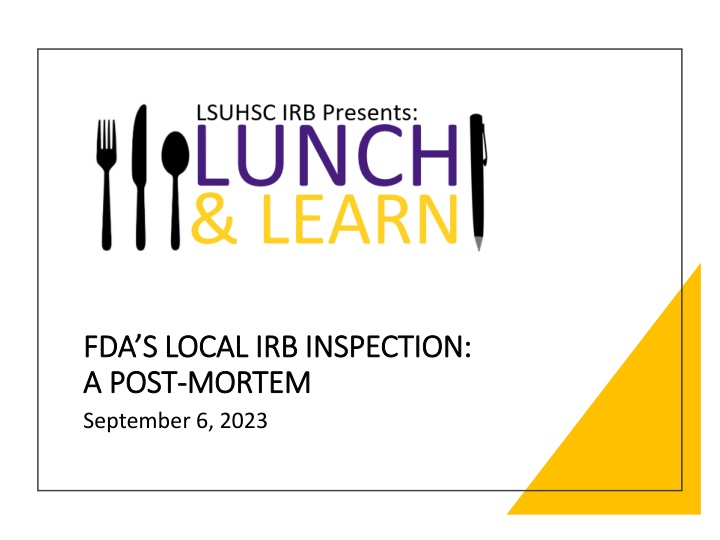
Overview of FDA Inspections & LSUHSC-NO IRB History
This document provides insights into FDA inspections of Institutional Review Boards (IRBs), highlighting the objectives, reasons for inspections, types of inspections, conduct of inspections, and LSUHSC-NO IRB history. It covers the purpose of FDA inspections, types of IRB inspections, conduct of IRB inspections, and the history of inspections at LSUHSC-NO IRB. The inspection observations made by inspectors during the latest inspection are also discussed.
Download Presentation

Please find below an Image/Link to download the presentation.
The content on the website is provided AS IS for your information and personal use only. It may not be sold, licensed, or shared on other websites without obtaining consent from the author. If you encounter any issues during the download, it is possible that the publisher has removed the file from their server.
You are allowed to download the files provided on this website for personal or commercial use, subject to the condition that they are used lawfully. All files are the property of their respective owners.
The content on the website is provided AS IS for your information and personal use only. It may not be sold, licensed, or shared on other websites without obtaining consent from the author.
E N D
Presentation Transcript
FDAS LOCAL IRB INSPECTION: FDA S LOCAL IRB INSPECTION: A POST A POST- -MORTEM MORTEM September 6, 2023
Objectives To educate study teams on FDA Inspections of IRBs To inform study teams of the observations from the most recent IRB Inspection done by the FDA To inform study teams of the IRB s planned corrective actions and how that may impact them 2
FDA IRB Inspections Why does the FDA inspect IRBs? FDA conducts IRB inspections to determine if IRBs are operating in compliance with current FDA regulations and statutory requirements and if the IRBs are following their own written procedures. When are IRB inspections conducted? FDA inspections of IRBs generally fall into one of two categories: Surveillance inspections (Routine) periodic, scheduled inspections to review the overall operations and procedures of the IRB. Directed inspections (For Cause) unscheduled inspections focused on the IRB s review of a specific clinical trial or trials, generally resulting from a complaint, clinical investigator misconduct, or safety issues pertaining to a trial or site. 3
Conduct of an IRB Inspection IRB Inspections are conducted similarly to a study-specific inspection. Institution is contacted by FDA Personnel to schedule a visit FDA Personnel (1-2 inspectors) arrive, present credentials, and issue FDA 482 Notice of Inspection to the IRB Chair Inspector(s) interview appropriate people and obtain information about IRB s policies and procedures Throughout the inspection, the inspector(s) typically review and copy: Records of IRB Membership IRB procedures and guidelines Minutes of the IRB Meetings (past 1-3 years) Documents related to a certain number of studies regulated by the FDA Any other relevant materials At the end of the inspection, an exit interview is conducted with institutional and IRB representatives to discuss findings. 4
History of LSUHSC IRB Inspections The LSUHSC-NO IRB has been inspected by the FDA on three occasions: Mar. 2010: Routine Inspection July 2023: Routine Inspection Sept. 2016: Routine Inspection 5
Inspectors Observations During this most recent inspection, the following observations were made by the Inspector: The IRB occasionally failed to document non-significant/significant risk determinations for device trials The IRB did not follow written procedures for ensuring prompt reporting to the FDA of the following: Serious or Continuing Non-Compliance Suspension of IRB Approval Termination of IRB Approval 6
Corrective Action Plans The IRB occasionally failed to document NSR/SR risk determinations for device trials. All device trials will now be reviewed and discussed at a convened IRB meeting to ensure that a risk determination or concurrence is properly made and documented. Administrative reviewers will request formal documentation from the Sponsor when the Sponsor has decided on the risk determination to assist the Board in determining concurrence. What does this mean for you? If your study involves use of a device regulated by the FDA (whether investigational or approved for marketing), please submit it as a Full Board application. Please provide all documentation from the sponsor related to the device (i.e., brochures, FDA letters, etc.) 7
Corrective Action Plans The IRB did not follow written procedures for ensuring prompt reporting of serious or continuing non-compliance to the FDA. Policy 4.03 will be revised to state, Two or more lapses in IRB approval is considered continuing non-compliance and requires prompt reporting to the institutional official and relevant agencies. Enrollment of subjects or any interaction with subjects during a lapse that is not pre-approved by the IRB will be considered serious non-compliance and require prompt reporting to the institutional official and relevant agencies. What does this mean for you? Submit your renewals/closure requests in a timely fashion (i.e., 30 days in advance of continuing review date for Full Boards, 15 days in advance for Expedited/Exempt) Do not conduct any study activities during a lapse in approval unless it is in the subject s best interest/safety. This must be reported to and approved by the IRB. 8
Corrective Action Plans The IRB did not follow written procedures for ensuring prompt reporting of suspension or termination of IRB approval to the FDA. The IRB will report to the FDA all instances of suspended IRB approvals, and administrative closures of studies that involve misconduct or fail to submit a renewal within 60 days of approval lapse. What does this mean for you? Submit your renewals/closure requests in a timely fashion (i.e., 30 days in advance of continuing review date for Full Boards, 15 days in advance for Expedited/Exempt). Do not conduct any study activities during a lapse in approval unless it is in the subject s best interest/safety. This must be reported and approved by the IRB. If your study is administratively closed, respond promptly to IRB inquiries about any study activities that may have occurred during a lapse. 9
Save the Date! October Lunch & Learn Date: Time: Topic: October 4, 2023 12:00 PM Exempt Determinations & Limited IRB Review 11


